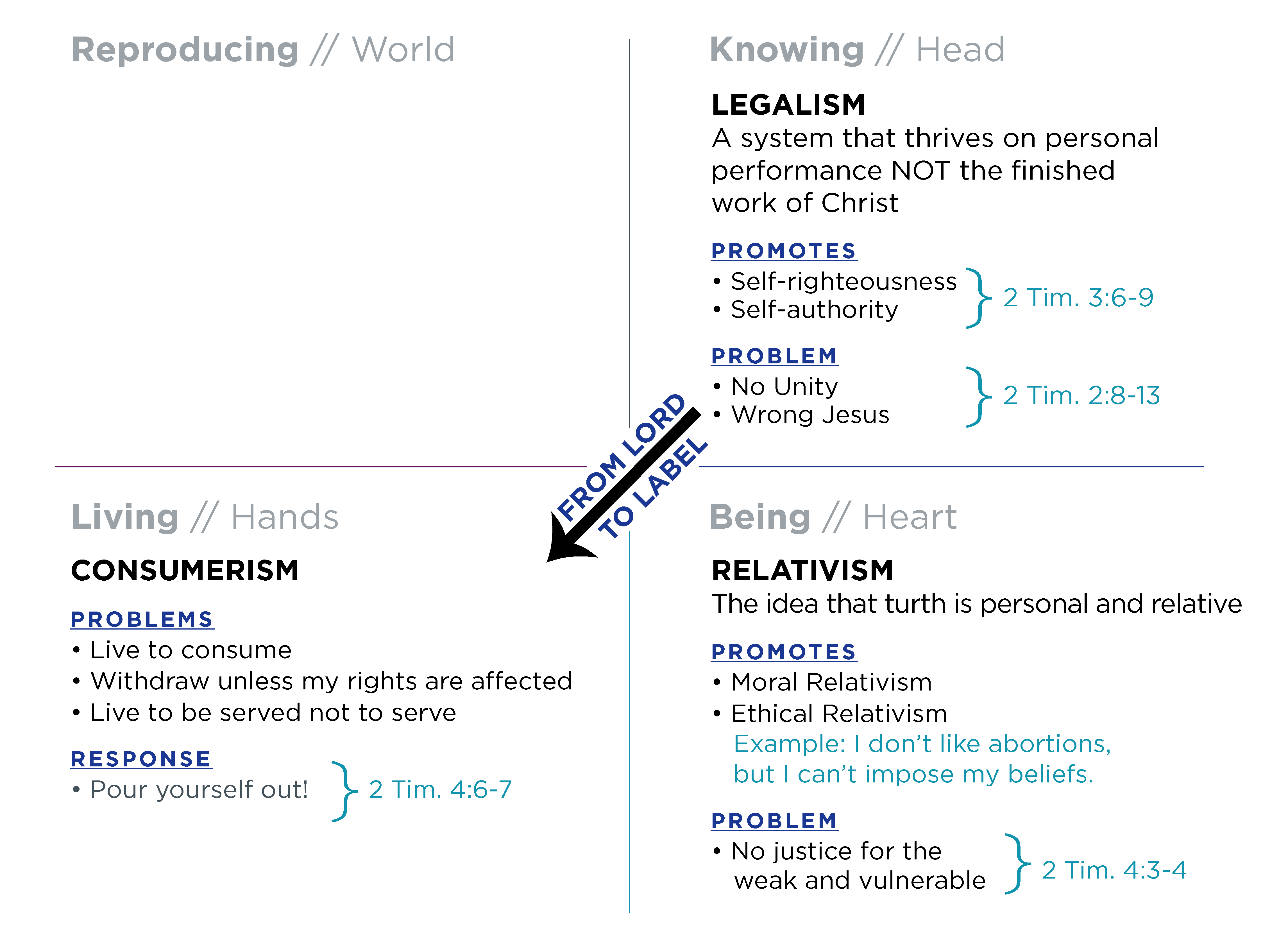Virtual Reality | Day 24
Living
Christian leaders love people enough to supplement telling the truth with showing them the truth and the way (2 Timothy 3:16-17).
When virtues go wrong, when the mind and heart harden to the work of the Spirit, leaders fall foul to the temptations to legalism, relativism, consumerism, and authoritarianism. Today I’m returning to the idea I introduced on day 17, one week ago. That day I introduced the third segment of our two-by-two matrix. Over the last week I’ve suggested the kind of life that honors Christ.

- Leaders show their faith to others (1:8), avoiding theological arguing because it is counter-productive and brings disunity (2:14).
- Leaders make themselves available to others and their faithfulness is seen in action (3:14).
- Leaders encourage others to a lifestyle of godliness (2:20-26) through their personal pursuit of righteousness (4:8).
The life of godliness, motivated by God’s holiness and love, is an expression of Christ’s lordship over a person’s life.
The antithesis to this is consumerism. Consumerism is a social and economic system that encourages the acquisition of goods and services in ever-increasing amounts. Consumerism is one of the strongest influences in the western world. Its power is witnessed in the constant presence of advertising, not to mention the things we’re told we need in order to live happier and more productive lives. The problem with consumerism is not in acknowledging that we need something, but in the idea that we need that something in order to be fulfilled.
In a recent article in Christianity Today, entitled “From Lord to Label, How Consumerism Undermines our Faith,” we read:
Christian critiques of consumerism usually focus on the dangers of idolatry—the temptation to make material goods the center of life rather than God. This, however, misses the real threat consumerism poses. My concern is not materialism, strictly speaking, or even the consumption of goods—as contingent beings, we must consume resources to survive. The problem is not consuming to live, but rather living to consume.
Paul had already told Timothy that he was not to live to consume.
But if we have food and clothing, we will be content with that. (1 Timothy 6:8)
For Paul, joy in life was found in serving Christ.
The problems such a system is to the Christian are too numerous to list. To summarize:
- A person lives to consume rather than consumes in order to live.
- A person withdraws from meaningful sacrifice for others unless their rights are affected, then they step up.
- A person lives to be served rather than to serve.
We haven’t even mentioned the environmental problems consumerism causes. Paul’s response to this pursuit of things is easily seen in 2 Timothy 4:6-7:
For I am already being poured out like a drink offering, and the time for my departure is near. I have fought the good fight, I have finished the race, I have kept the faith.
The idea behind “being poured out like a drink offering” is that of the sacrifice of the drink offering in the Old Testament. It’s first used by Jacob in Genesis 35:14. In the Old Testament, wine was poured out onto the altar fire for each lamb sacrificed (see Numbers 15:4-5). Different drink offering amounts were required depending on the animal sacrificed (see Numbers 15:6,10). When an animal was sacrificed, the drink was poured out.
The drink offering metaphor is used by Jesus in the last supper where, picking up a cup of wine, he referred to the new covenant instituted through His blood. Jesus saw His pending sacrifice fulfilling the need of a drink offering. A little while later Jesus’ blood would quite literally pour out of His side as a spear was thrust into it upon His death on the cross (John 19:34).
Paul applied this metaphor to his own life on two occasions—here and in Philippians 2:17. On both occasions he compared his dedication to Christ like wine being poured out of a vessel onto an altar.
There is, however, one subtle difference between the words of Philippians 2 and that of 2 Timothy 4. In Philippians Paul clearly hoped for more years of service. His intention was to serve Christ faithfully for many more years. Note the emphasis:
But even if I am being poured out like a drink offering on the sacrifice and service coming from your faith, I am glad and rejoice with all of you.
Compare the underlined text to what we read here:
For I am already being poured out like a drink offering, and the time of my departure is near.
Paul realized that the end of his earthly ministry was close at hand. Rather than spending his life being served, Paul has spent it pursuing Christ. His time on this earth has come to an end and rather than live to consume he has consumed, sometimes very little, in order to live. Rather than withdraw from meaningful service of others, Paul has stepped into the fray for Christ on behalf of others. Let us live the same way.
Food for Thought:
- How tempting is the pull of consumerism for you?
- In what ways are you pouring yourself out for Christ on behalf of others?


Leave a Comment